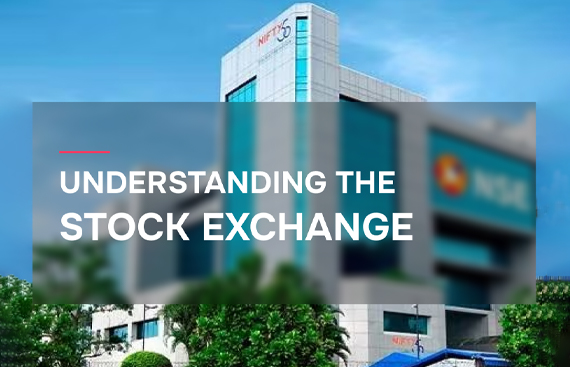Understanding Stock Exchange - Meaning, Objectives & Functions

The stock market is a vital part of the global economy, and stock exchanges play a central role in its functioning. They act as marketplaces where investors can buy and sell financial instruments like stocks, bonds, and derivatives.
In addition to traditional trading methods, the use of a share market app has become increasingly popular. These apps provide convenient platforms for investors to access stock exchanges directly from their mobile devices, facilitating easier and quicker transactions.
What is a Stock Exchange?
A stock exchange is a regulated and transparent platform that facilitates the trading of securities between buyers and sellers. It operates under a set of rules and regulations established by a governing body, such as the Securities and Exchange Board of India (SEBI) in India. Unlike traditional markets where goods are physically bought and sold, stock exchanges deal with electronically traded financial instruments.
How Does a Stock Exchange Work?
Stock exchanges function through a series of interconnected processes:
1. Listing Securities
Companies meet specific exchange criteria to issue stocks for capital raising purposes.
2. Trading Mechanism
Orders to buy and sell securities are placed through brokers or electronic platforms. For instance, investors can use user-friendly apps like the HDFC Sky app, which allows them to specify quantity and price. Exchanges match these orders based on price and time priority to ensure efficient trade execution.
3. Clearing and Settlement
After trade execution, clearinghouses verify trade details and reconcile obligations between buyers and sellers. Settlement involves the exchange of securities and funds to complete transactions securely and legally.
Objectives of a Stock Exchange
Stock exchanges serve several critical objectives within the financial system:
- Facilitate Capital Formation: Companies can raise capital by issuing and selling securities on a stock exchange. This allows them to finance expansion, research and development, and other important projects.
- Enable Easy Trading and Liquidity: Stock exchanges provide a platform for investors to conveniently buy and sell securities. This promotes liquidity, enabling investors to convert their investments into cash quickly and efficiently.
- Establish Fairness and Transparency in Pricing: Market forces of supply and demand determine security prices through open and competitive trading on the exchange. This transparency helps investors make informed decisions based on reliable information about the value of securities.
- Safeguard Investors and Build Confidence: Stock exchanges prioritize investor protection by establishing rules and regulations that govern trading activities and prevent unfair practices. This helps to maintain market integrity and build investor confidence.
Functions of a Stock Exchange
Stock exchanges perform a variety of essential functions that ensure the smooth operation of the market:
- Providing a Trading Platform: The exchange provides a centralized platform for buyers and sellers to interact and execute trades electronically.
- Price Discovery: Through buy and sell orders, the exchange facilitates the process of determining the fair market value of securities based on supply and demand.
- Ensuring Liquidity: Stock exchanges promote liquidity by bringing together a large pool of buyers and sellers, enabling investors to buy and sell securities efficiently.
- Market Regulation: The exchange enforce rules and regulations to ensure fair trading practices, protect investors, and maintain market integrity.
- Information Dissemination: Stock exchanges provide investors with timely and accurate information about listed companies and market activity.
- Trading on Margin: Stock exchanges facilitate margin trading, enabling investors to use borrowed funds to boost buying power, potentially enhancing returns but carrying risks like margin calls during market declines.
Benefits of Stock Exchanges
Stock exchanges offer a multitude of benefits for both companies and investors:
For Companies
1. Capital Formation and Expansion
Stock exchanges provide companies with a platform to raise capital by issuing shares to the public. This capital infusion is crucial for funding growth initiatives such as research and development, expansion into new markets, and acquisition of assets or technologies.
2. Enhanced Brand Awareness and Market Credibility
Listing on a stock exchange enhances a company's visibility and credibility. It signals transparency and financial stability to stakeholders, including customers, suppliers, and potential business partners. This improved market perception can lead to increased business opportunities and stronger relationships.
3. Access to a Diverse Investor Base
Publicly traded companies gain access to a broad spectrum of investors, including institutional investors, mutual funds, pension funds, and individual investors. This diverse investor base not only provides financial support but also enhances liquidity and market stability for the company's shares.
For Investors
1. Investment Diversity
Stock exchanges offrr invrstors a wide array of invrstment options, including stocks, bonds, ETFs, and derivatives. This diversity allows investors to create portfolios that align with their risk tolerance, financial goals, and investment time horizon.
2. Potential for Capital Appreciation
Investing in stocks provides investors with the opportunity to benefit from capital appreciation. As companies grow and generate profits, their stock prices can rise, resulting in increased wealth for shareholders through share price appreciation and dividends.
3. Transparent and Regulated Environment
Stock exchanges operate within a regulated framework that ensures fair trading practices, transparency, and investor protection. Regulatory oversight by governing bodies promotes market integrity, disclosure of material information, and adherence to corporate governance standards, thereby enhancing investor confidence.
Conclusion
Stock exchanges are pivotal in global economies, facilitating capital formation, enhancing market transparency, and offering diverse investment opportunities. HDFC Sky stands out as the best share market app, providing seamless access, robust security features, and user-friendly interfaces for efficient trading experiences.
